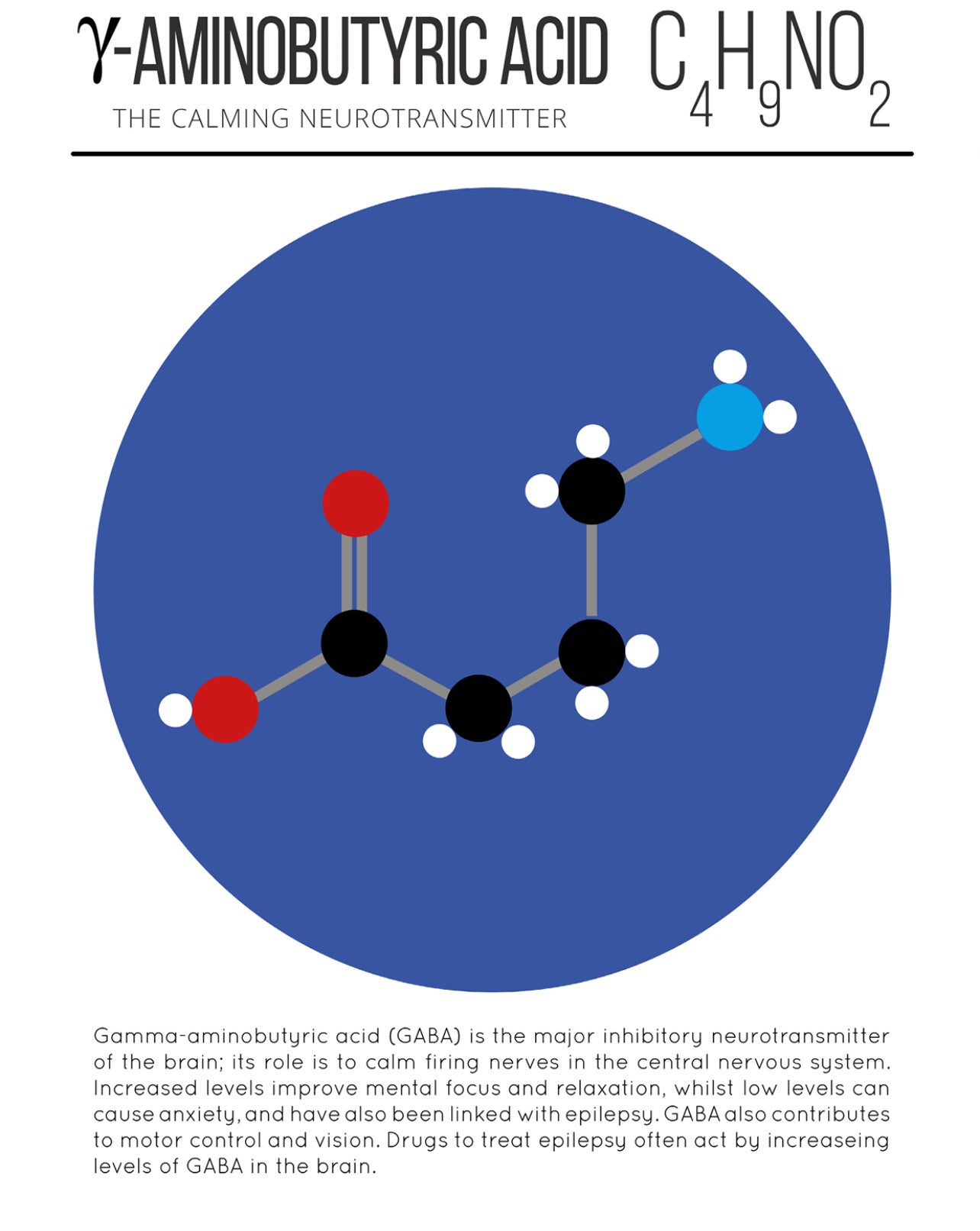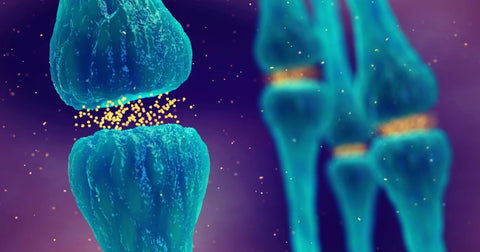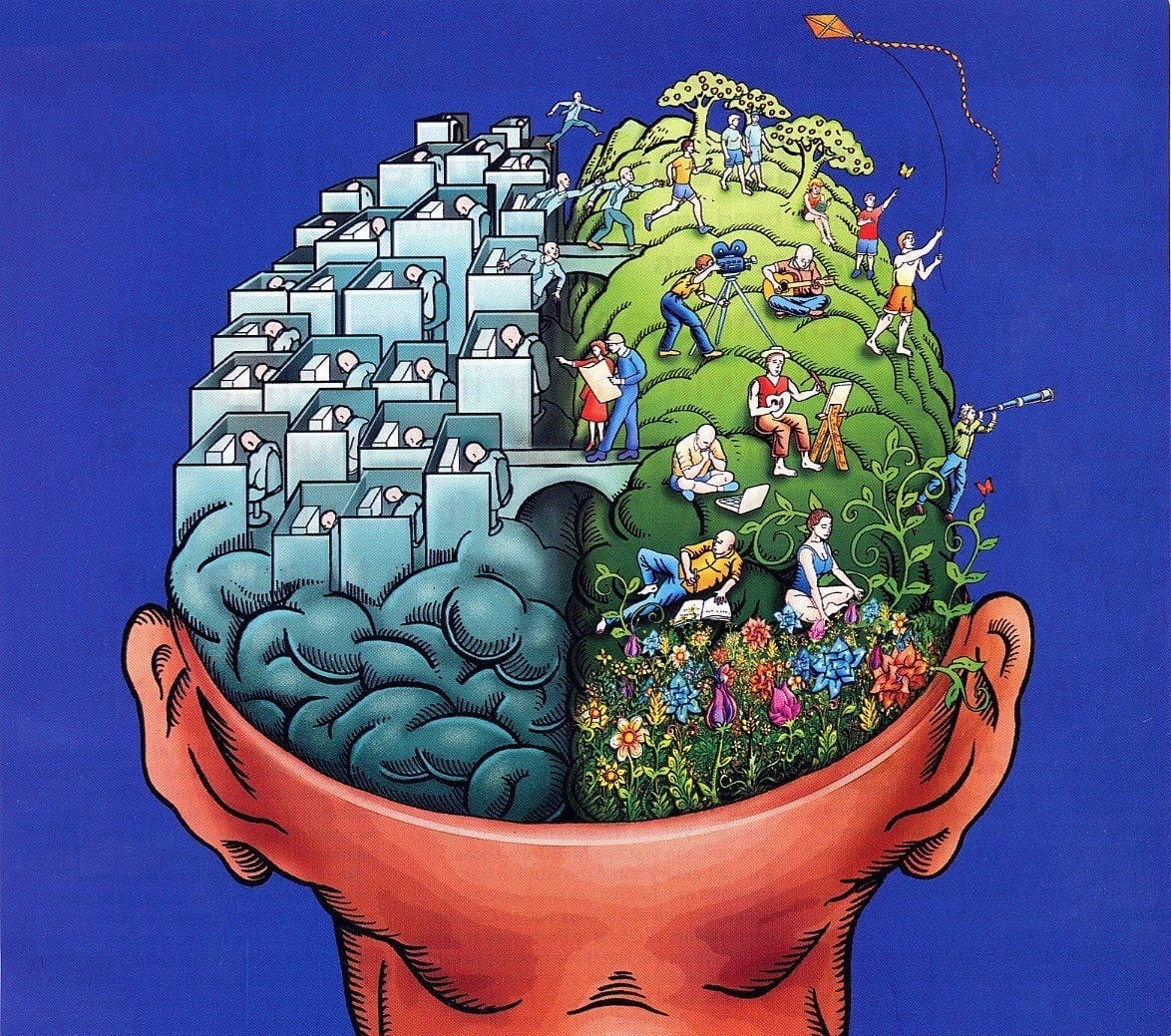
How Does GABA Regulate My Nervous System?
Are you struggling with anxiety, feel overwhelmed, tired but wired?
Do you have difficulty concentrating and can't focus?
Is your mood low, you feel like you might burn out and you worry all the time?
Are you feeling a little out of control? Like you don’t know how to calm yourself down? Most of us do, at one time or another.
These are all psychological indicators that you might be low in GABA.
Signs of low GABA also show up in your body.
Do you feel tense with muscle aches and pains?
Are you struggling to get off to sleep?
Do you have digestive problems and crave sugar and carbs all the time?
Do you startle easily and feel sensitive to bright lights?
These are all messages that you are low neurotransmitters and nutrients.
That out of control feeling is usually associated with the sympathetic nervous system.
Your sympathetic nervous system is the part of our nervous system that mobilises us into action. If your nervous system detects a threat, real or perceived, it will trigger your fight/flight/freeze response.
If there isn’t a real threat, and you do not need the mobilisation of our protective mechanisms, then you need to recruit your parasympathetic nervous system, which is the part that calms you down.
GABA is the neurotransmitter that regulates your nervous system, which in turn regulates your mood and helps you avoid extreme emotions, like fear or anxiety.
Stress can decrease levels of GABA in the brain.
Low GABA activity has been shown to cause more severe anxiety symptoms, while healthy levels of GABA may help calm symptoms and make them more manageable.
Life is stressful for many of us and our general anxiety levels are higher than ever.
Adapting to a fast-paced, interconnected world is a significant source of stress and anxiety for us all. And while a little stress is a good thing, chronic stress can build up to leave us feeling anxious, burned out, short-tempered and depressed.
And low in GABA.

You need a nervous system reset
There are signs of what is happening inside the body — and in particular, the brain — when we’re anxious.
Research has shown how living with constant fear and anxiety is actively arousing our nervous system, disrupting brain chemistry and damaging brain cells, resulting in physically altered brain structures and accelerated brain ageing.
It has revealed that the outward signs of anxiety are just the tip of the iceberg, with much more going on beneath the surface. In fact, anxiety has been shown to actually change the brain’s structure.
Anxiety is especially damaging to the amygdala, an almond-shaped region of the brain that regulates basic emotions, such as fear and anxiety.
These changes have been linked to behaviours associated with anxiety and depressive disorders.
Anxiety feels like stress in your body and when you are stressed your amygdala responds with your fight, flight, freeze response.
With chronic stress and trauma your amygdala can become permanently switched on. Your brain and body become hyper-aroused as your brain anxiously scans for threats.

Did you know that anxiety uses up nutrients in your body and brain?
This impacts the levels of your nutrients and neurotransmitters in your brain as your body uses up ingredients quickly to make all the chemicals of your stress response.
Chronic stress uses up glutamine, the main ingredient that we need to make GABA, leading to high levels of anxiety and exhaustion.
Stress has a profoundly negative effect on the body’s nutrient stores, which is why you often feel depleted and lacking in energy during these times.
As well as rapidly using up essential nutrients as part of the body’s stress response, stress can also prevent the body from absorbing essential nutrients.
It is therefore more important than ever to properly nurture the body and provide it with nutrients during and after stressful periods in order to protect your mental and physical health.
Increasing intakes of the following key nutrients can help to protect against the adverse effects of stress:
1. Magnesium
2. Vitamin C
3. Vitamin B5
4. Vitamin B6
5. Zinc
6. Probiotics
And 7. Glutamine
GABA is the key to resting your nervous system by switching off your stress response.
One way to calm your amygdala and regulate your anxiety is to have a tool kit at hand that boosts your GABA levels.
How does GABA regulate anxiety?
When we experience stress and anxiety, the adrenal glands are triggered to produce hormones that trigger what we know as fight-or-flight responses, like speeding up your heartbeat or giving you an adrenaline rush.
GABA counteracts these natural stimulants by relaxing the brain.
Chronic stress uses up glutamine, the main ingredient that we need to make GABA, leading to high levels of anxiety and exhaustion.

What does GABA do?
Reduces mental and physical stress
Eases feelings of anxiousness
Decreases muscle tension
Creates a calmness of mood
Supports balanced blood pressure
Helps to induce sleep
So if you often feel worried, tense, overwhelmed or have trouble falling asleep due to racing thoughts, GABA could be the key to calming your mind, soothing your nervous system and helping you power down at night to get a good nights sleep.
Gamma-aminobutyric acid (GABA) is a neurotransmitter, or chemical messenger, in the brain. It blocks specific signals in the central nervous system, calming down the brain. This provides a protective and soothing effect on the brain and body.
This activity produces effects such as:
relieving anxiety
reducing stress
improving sleep
The brain naturally releases GABA at the end of a day to promote sleepiness and allow a person to rest.
What is GABA good for?
I call GABA the brakes of the brain.
Specifically, GABA blocks certain nerve signals in the brain to reduce fear, anxiety, and stress. Without the right level of GABA in the body, conditions such as anxiety disorders may become worse.
A recent study indicates that GABA also enhances alpha wave production in the brain to promote relaxation and moderate occasional stress.
GABA is most often used as an anti-anxiety remedy but has many other reported benefits:
- Helps with inflammation issues, which means it may provide relief for people with PMS or other conditions that come with chronic pain.
- Helps with recovery and may increase exercise tolerance.
- Regulates muscle tone.
- Keeps your body in overall mental and physical balance.
- Helps with PMS and the menopause as it interacts with progesterone levels.
It’s high concentration in the hypothalamus which is the region of the brain that regulates functions such as sleep cycles, body temperature and the activity of the pituitary gland.
The pituitary gland is the master endocrine gland affecting all hormone functions of the body.
- Plays a role in the healthy functioning of the body’s immune and endocrine systems, as well as in the regulation of appetite and metabolism.
- Has an important role in our digestive system contributing to gut health and gastrointestinal function.
- It works to support motility, control inflammation and support immune system function, and
- Helps regulate hormone activity.
How do I know if I am low in GABA?
So what does low GABA look like?
Low GABA levels appear to us in both physical and psychological signs.
A growing body of research shows that low levels of GABA can be a factor in:
Chronic stress
Burn out
Anxiety
Panic attacks
Depression
Feel overwhelmed
Easily agitated
Tired but wired
Difficulty concentrating and memory problems
Physical tension and pain
Muscle aches and head aches
Sleeping difficulties
Sensitivity to bright lights and loud sounds
Digestive problems
Carb cravings
Substance use disorders

What happens if you have low levels of GABA?
GABA stops messages related to extreme moods. In other words, GABA calms your nervous system down, helping you to not become overly anxious or afraid.
The amygdala is an almond-shaped nucleus located within the temporal lobe of the brain and is thought to play a crucial role in the regulation of emotional processes.
GABA inhibits the amygdala and prevents us from inappropriate emotional and behavioural responses keeping a balance between neural excitation and inhibition
Problems with GABA signalling play a role in disorders that affect your mental health or your nervous system. These are known as psychiatric and neurologic conditions.
What causes GABA deficiency?
Many things can impact GABA levels, which contribute to deficiency:
1 Prolonged stress
Research shows coping with stressors both as adult and in and early life can directly influences levels of GABA and it how GABA functions in the body.
2 Genetics
If you have glitches on genes (notably MTHFR) that inhibit the absorption of B vitamins - especially B6 - it is difficult to make high enough levels of neurotransmitters, including GABA.
3 Nutrient deficiencies
Vitamin B6 deficiency is relatively common in the population.
B6 is essential for the production of many neurotransmitters involved in brain health including learning, cognition, mood, and memory.
Vitamin B6 is a key GABA vitamin.
B6 deficiency has been shown to lead to a decrease in GABA concentration in the brain. GABA is an inhibitory neurotransmitter, so when levels decrease, this leads to an increase in the excitatory neurotransmitter, glutamate.
Strong evidence suggests that changes in this GABA-Glutamate balance lead to sleep and mood problems, as well as loss of stress control.
4 Low serotonin levels
Serotonin is a positive regulator of GABA. Low serotonin levels are frequently an underlying component of many clinical conditions that are also related to GABA function including insomnia, depression, and anxiety.
Neurotransmitter tests show that GABA needs serotonin to function properly.
5 Low progesterone levels
This occurs particularly in the second half of the cycle or pre/post menopausal.
Progesterone helps with GABA and oestrogen supports serotonin production which is why anxiety and mood fluctuate with hormone and neurotransmitter levels.
6 Low exercise levels
Sedentary lifestyles lower GABA levels. Studies show that exercise activates the metabolic pathway that replenishes neurotransmitters including GABA.
In tests, before and after three vigorous exercise sessions lasting between eight and 20 minutes GABA levels increased in the participants who exercised, but not among non-exercisers.
How do I increase GABA in my brain?
The best way to increase GABA is to stimulate your vagus nerve.
Stimulating the vagus nerve stimulates the parasympathetic nervous system, which in turns reduces our neurophysiological experience of stress.
It reduces our heart rate and blood pressure.
It influences the limbic system in our brain, where emotions are processed.
It stimulates digestion and creates an increased feeling of well-being.
Start practicing the art of stimulating your vagus nerve to boost your GABA levels, relieve anxiety, depression, tension and the general sense of unease when stress builds up.
If you would like to know the best ways to activate your vagus nerve keep reading.
Foods to eat to increase GABA levels:
green, black, and oolong tea
fermented foods including kefir, yogurt, and tempeh.
whole grains
fava beans
soy
lentils and other beans
nuts including walnuts, almonds, and sunflower seeds
fish including mackerel, shrimp and halibut
fruit and vegetables including citrus, tomatoes, berries, spinach, broccoli, potatoes and cocoa.

How to increase GABA with supplements?
Here are the supplements you can take:
Glutamine
Methylated Vitamin B6 + B5
Vitamin C
Zinc
Theanine
Magnesium
Probiotics
Vitamin C
An essential immune-supporting nutrient, which is found in high amounts in the adrenal glands and is released in response to stress.
Zinc
A commonly deficient mineral, which is depleted by stress and plays an important role in modulating the body’s stress response
L-Theanine
L-theanine is found in tea - especially green tea - and it promotes relaxation and facilitates sleep by contributing to a number of changes in the brain:
- Boosts levels of GABA, serotonin and dopamine
- Promotes sleep
- Reduces stress chemicals to help with stress and anxiety
- Enhances alpha brain waves
L-theanine triggers the production of alpha-waves, which enhance relaxation, focus, and creativity.
Alpha brain waves are associated with a state of “wakeful relaxation.” That’s the state of mind you experience when meditating, being creative, letting your mind wander in daydreaming or during REM sleep.
Making green tea your drink of choice is a great way to boost your theanine levels.
Magnesium
Magnesium has been shown to modulate GABA activity in the brain. It does this by facilitating GABA neurotransmission and boosting its effects of relaxation.
Magnesium also helps to relax the central nervous system and your muscles. It does this by helping to activate the parasympathetic nervous system – that is responsible for helping us to rest and digest and reducing cortisol levels.
We can find magnesium in foods such as avocado, nuts and seeds, legumes and some whole grains. Studies have shown that supplementing with magnesium can be very effective in reducing symptoms of anxiety.
Vitamin B6
GABA is produced via the activity of an enzyme called glutamic acid and GABA, which requires vitamin B6 as a cofactor.
Studies show that the B6 levels of an individual have significant effects on the central production of both GABA and serotonin neurotransmitters that prevent symptoms of depression and anxiety.
B6 can be found in all animal products, as well as grains, pulses, eggs and dairy.
Vitamin B5
An important nutrient co-factor required for the adrenal glands to produce neurotransmitters, hormones and energy
Probiotics
Gut bacteria including the Bifidobacteria family and by the Lactobacilli family have been shown to produce GABA.
This further strengthens the increasing evidence for the gut-brain connection and that having a healthy microbiome in your gut is a crucial pillar in brain health.
To balance your mood with foods rich in probiotics and prebiotics try adding these:
1 Chicory, endive, lentils, asparagus, beans, garlic, onions, leeks, bananas, beets, broccoli)
2. All fermented foods
3. Whole fat live yogurt
Other life changes can reduce gut damage + also boost your gut health significantly:
1 Eat more fibre (fresh vegetables, whole fruit, whole grains)
1 Reduce junk + processed food
2 Reduce sugar (high quality maple syrup + honey contain prebiotics)
3 Increase Omega 3 intake (nuts, seeds, oily fish)
4 Drink less alcohol
5 Increase antioxidant foods (berries, turmeric, green tea)
Or add a probiotic containing Bifidobacteria and Lactobacilli strains.
And
Glutamine

What is L-Glutamine?
Glutamine is a new buzz supplement but if you’re not sure what it’s all about I thought I would write about it from the brain health perspective.
It is the most abundant amino acid in our body and it is a significant building block of protein meaning that your body requires a lot of it.
Your body naturally produces it from foods high in protein like beef, chicken, eggs, fish and beans.
However, many people don’t eat enough protein in their meals leaving your body struggling to produce enough glutamine. And if you are stressed - either physically and psychologically - glutamine will get used up very quickly.
Supplementing with glutamine is an excellent way to ensure your body can make enough GABA to reduce the effects of stress and anxiety.
Have a look at this supplement which has all the GABA producing ingredients, including loads of glutamine, in one easy place:
Calm Me
What are the benefits of taking glutamine?
How L-Glutamine helps reduce symptoms of stress and anxiety
L-Glutamine is the primary fuel used by the brain to build and balance the neurotransmitter GABA which plays a significant role in mood and anxiety.
And in sleep.
Glutamine before bed is a good idea
Do you feel tired but wired when you go to bed and struggle to get off to sleep? Yes? Then that is a sign of low GABA and one of the best ideas to calm your thoughts and slow your mind in the evening is to take glutamine before bed.
It is known as the ‘calming amino acid’ for its effectiveness in reducing stress-related anxiety symptoms.
It’s Yoga for the brain.

Chronic stress uses up glutamine leading to high levels of stress and anxiety and our immune system and gut being vulnerable.
Glutamine is the primary fuel source for the sealing and maintaining the lining of the intestines. With a healthy gut lining you can absorb more nutrients, reduce leaky gut and toxins entering our blood stream as well as reduce bloating.
By healing your gut it also helps to boost your immune system. About 60-80% of our immune systems lives in our gut so by having a healthy gut microbiome you are also strengthening your ability to protect and recover from disease.
It’s pretty amazing how nutrients can help isn’t it?
So how do you fix GABA deficiency?
I’m often asked how you can increase your GABA so thought I would put together a few tools to help you recharge your GABA levels.
YOUR GABA TOOL KIT - the key to resetting your nervous system
5 Ways to Increase GABA
1. How to increase GABA with supplements?
Take:
Glutamine
Methylated Vitamin B6
Theanine
Magnesium
Probiotics
All the GABA producing ingredients are in one easy place are here in
Calm Me

2. De-stress with meditation or yoga
Many studies have shown that meditation and meditative movement practices like yoga or tai chi have scientifically confirmed benefits, including increasing GABA and easing stress and anxiousness.
Research has also shown that people who meditate have increased levels of GABA and reduced levels of the stress hormone cortisol.
There are lots of free guided meditations on Apps and on YouTube so have a search, try a few and find one that works for you.
If you struggle to meditate think about the activities that help your brain get into a relaxed state - like walking, reading, listening to music, podcasts, audiobooks, cooking, art, cleaning - and these can be your meditation.
3. Get moving to boost GABA.
In addition to its well-known stress relief benefits, regular exercise helps to increase GABA in the brain.
Low impact cardiovascular activities are the best: nothing beats a good long walk.
Bringing to a consistent exercise routine into your life can help increase your GABA levels over time.
Forest bathing and walking in blue or green spaces, especially the sea side or evergreen woodlands, are fantastic ways to boost your GABA levels and destress. Phytoncides are emitted by plants and are absorbed through our skin and lungs to help reduce cortisol, boost GABA and help us to relax.
4. Eat foods that contain GABA or support its production.
GABA is produced in your brain from glutamate, another amino acid that is generally abundant in the human diet. It’s found in particularly high concentrations in these foods:
Aged, cured and preserved foods, including cheeses and meats
Slow-cooked meats and poultry
Bone broths
Fish
Eggs
Mushrooms
Tomatoes
Broccoli
Walnuts
Soybeans

5. Vagus nerve stimulation
The best way to increase GABA is to stimulate your vagus nerve.
The vagus nerve system acts to counterbalance the fight or flight system and can trigger a relaxation response in our body. It is one of the cranial nerves that connects the brain to the body.
Stimulating the vagus nerve stimulates the parasympathetic nervous system, which in turns reduces our neurophysiological experience of stress.
It reduces our heart rate and blood pressure.
It influences the limbic system in our brain, where emotions are processed.
It stimulates digestion and creates an increased feeling of well-being.
Start practicing the art of stimulating your vagus nerve to boost your GABA levels, relieve anxiety, depression, tension and the general sense of unease when stress builds up.
How To Activate Your Vagus Nerve
- Deep diaphragmatic breathing (on all the boxcards in M+E)
- Use the Look For The Plane In The Sky exercise (explained here)
- Eat GABA food (above)
- Take GABA supplements (above)
- Splashing cold water on your face, or have a cold shower, or go cold water swimming
- Meditating/Mindfulness
- Doing yoga
- Singing
- Self-Havening techniques (see previous newsletter)
- Spend time in nature - shinrin yoku/forest bathing
- Laughing out loud
- Mild exercise
- Massage
- Gargling
- Cultivate healthy intestinal bacteria, use probiotics
- Tongue exercises
The vagus nerve is a major part of how our bodies and brains function and by stimulating it you can boost the GABA in your brain.
Try this exercise to reset your nervous system:
Salamander Reset
- Get on all fours
- Head is facing down
- Look far left with your eyes without turning your head
- Tilt your head to the left
- Let your left spine twist with the head tilt to the left
- Hold for 30 to 60 seconds. Take deep breaths.
- Bring your head and spine to the centre to straighten out
- Repeat on your right side
Can you bring more of these into your everyday life?
It’s pretty amazing how we can help ourselves if we have a guide isn’t it?
You might think that you just have to accept that stress and anxiety are simply part of your life.
But you don’t have to.
You can make a change.
How do you fix GABA deficiency?
Take glutamine, magnesium, theanine and vitamin B6
Get outside to exercise
Do some yoga
Breathing exercises
Eat GABA foods

If you would like to read more about the emotional side of stress and what you can do to help yourself there’s lots of help in my most popular blog called:
Why Am I Always So Tired

Use this tool kit to make small changes to your routine and
your health and your life will feel transformed.
You can reduce your stress, have abundant energy and joy will come back into your life.
We all tend to eat the same sorts of foods each week which means that over time we start to miss some crucial nutrients.
It means that we end up with deficiencies and gaps without even realising it. This has a huge impact on how our bodies and brains work. We adjust and just think that it is our normal. It’s just what we have to put up with.
But this isn’t the case. You can make a change.
That’s where a high quality supplement can help fix the deficiencies, fill the gaps and help to optimise your brain health.
“For me, taking supplements is about optimising your current and future health. Where some see supplements, I see a happier future"
Your health and your life feels transformed.
You can reduce your stress, have abundant energy and joy comes back into our lives.
How you feel tomorrow, starts today.
Let’s start,
E
Anxiety disorders and GABA neurotransmission: a disturbance of modulation
https://www.ncbi.nlm.nih.gov/pmc/articles/PMC4303399/
Effects of Yoga Versus Walking on Mood, Anxiety, and Brain GABA Levels
https://www.ncbi.nlm.nih.gov/pmc/articles/PMC3111147/
Effect of Acute Psychological Stress on Prefrontal GABA Concentration
https://www.ncbi.nlm.nih.gov/pmc/articles/PMC3107037/
Sleep
https://pubmed.ncbi.nlm.nih.gov/19014069/
The Impact of Glutamine supplementation
https://molecularneurodegeneration.biomedcentral.com/articles/10.1186/s13024-016-0127-y
Glutamine increases GABA
https://pubmed.ncbi.nlm.nih.gov/17218538/
The effects of Magnesium on stress
https://www.ncbi.nlm.nih.gov/pmc/articles/PMC5452159/
Long term stress reduction with magnesium
https://pubmed.ncbi.nlm.nih.gov/27933574/
Nutritional and herbal supplements for anxiety and anxiety-related disorders: systematic review
https://www.ncbi.nlm.nih.gov/pmc/articles/PMC2959081/
Vitamin B6
https://link.springer.com/referenceworkentry/10.1007%2F978-3-319-40007-5_81-1
Psychobiotics and the Manipulation of Bacteria–Gut–Brain Signals
https://www.ncbi.nlm.nih.gov/pmc/articles/PMC5102282/
Probiotics and GABA
https://www.sciencedirect.com/science/article/pii/S1756464619305936
The Influence of Micronutrients on cognitive Function and Performance
https://journals.sagepub.com/doi/pdf/10.1177/147323000703500101
Ingestion of Lactobacillus strain regulates emotional behavior and central GABA receptor expression in a mouse via the vagus nerve
https://www.pnas.org/doi/10.1073/pnas.1102999108
Stress in Regulation of GABA Amygdala System and Relevance to Neuropsychiatric Diseases
https://www.frontiersin.org/articles/10.3389/fnins.2018.00562/full
https://www.psychiatrist.com/read-pdf/18680/







Leave a comment
This site is protected by hCaptcha and the hCaptcha Privacy Policy and Terms of Service apply.